How to Build Mental Toughness for Golf
Learn how to build mental toughness for golf with proven strategies to improve focus, resilience, and confidence on the course. Master your golf mindset today.
GOLF FITNESS


Golf isn’t just a game of physical skill—it’s a mental battlefield. Legendary golfer Gary Player once said, “Golf is a puzzle without an answer. I’ve found the answer to better golf is in the head.” Whether you’re an amateur golfer chasing a lower handicap, a professional golfer aiming for the top of the leaderboard, or a golf enthusiast looking to enjoy the game more, mental toughness is the secret sauce to unlocking your best performance. On championship golf courses or in the heat of high-pressure golf tournaments, your mindset can be the difference between crumbling and thriving. Picture yourself standing over a critical putt with the match on the line: Will you falter or rise to the occasion?
Elite golfers like Tiger Woods and Phil Mickelson have faced these moments countless times, and their ability to conquer mental challenges has defined their legacies. In this article, we’ll dive deep into golf psychology tips, mental strategies, and practical exercises to help you build a rock-solid golf mindset. Whether you’re recovering from a bad shot or tackling tough conditions, these tools will keep you focused, confident, and in control. Let’s tee off on your journey to a stronger mental game!
Mastering the Mental Game: The Secret Weapon for Amazing Golf Performance
Golf isn’t just a game of physical skill—it’s a mental battlefield. Legendary golfer Gary Player once said, “Golf is a puzzle without an answer. I’ve found the answer to better golf is in the head.” Whether you’re a junior or amateur golfer chasing a lower handicap, a professional golfer targeting top leaderboard positions, or simply a golf enthusiast striving for an exceptional golf experience, developing mental toughness is the secret sauce that transforms a challenging round into a celebration of focus, resilience, and growth. This guide explores a variety of mental strategies, routines, and practical exercises to help you build confidence, control your mind, and enhance your overall performance on championship golf courses and in high-pressure golf tournament situations.
The Core of Mental Toughness in Golf


Mental toughness in golf is the ability to maintain complete focus, a positive mindset, and unwavering confidence no matter how many bad shots or difficult conditions come your way. Every swing, every missed putt, and every unpredictable moment—from a poor shot to a bad practice session—challenges your mental focus. Unlike team sports, where you can rely on a basketball player or another teammate, golf demands complete individual control and self-reliance, making mental toughness essential.
What Does It Mean to Be Mentally Tough?
Staying Focused: Concentration in golf means shutting out distractions—whether it’s a noisy crowd at a golf tournament or the sporadic chatter on the course.
Positive Self-Talk: Transforming each mis-hit from a bad shot into a learning opportunity is at the core of golf psychology. As Bob Rotella highlights in Golf Is Not a Game of Perfect, the way you talk to yourself after a misstep sets the tone for your next shot.
Control and Confidence: Control is not about perfect swing mechanics or flawless execution every time but about having a confident routine that you trust, even when facing tough conditions like high winds or adverse game-time circumstances.
Crafting Your Pre-Shot Routine: The Roadmap to Consistency
A well-developed pre-shot routine is a proven strategy that helps golfers—both amateur and professional—to ground themselves before every shot. Many elite players, including Tiger Woods and five-time major winner Phil Mickelson, rely on routines that involve precise practice swings, deep breaths, and deliberate visualization. Here’s how you can build a routine that serves as your anchor in every situation:
Steps to a Perfect Pre-Shot Routine
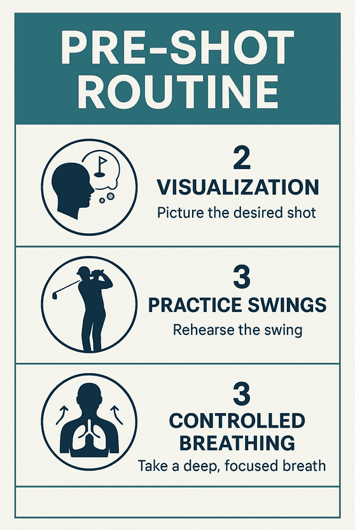

Visualize Success:
Before the swing, close your eyes briefly and see the perfect shot. Picture your golf ball flying effortlessly towards the target, landing exactly where you intend. This mental image sets the stage for a successful shot.
Practice Swings and Cue During Practice Swings:
Take a few practice swings to feel the rhythm of your golf swing mechanics. Use these cues to reinforce muscle memory.
Focus on Your Body Language:
Maintain an improved body language—shoulders back, head up, and posture that exudes confidence. The way you carry your golf club and hold yourself not only enhances mental focus but also signals to your inner mind that you’re in control.
Deep Breaths and Breathing Exercises:
Engage in a controlled breathing technique. For instance, try the “4-4-4 Method”: Inhale for four seconds, hold for four seconds, and then exhale for four seconds. This exercise grounds your mind, reduces stress, and prepares you to tackle even those critical putt situations.
By adopting these elements into your daily routine, you create a structured approach that minimizes the chances of a missed putt ruining your focus—and, in turn, builds your overall confidence in competition.
Mastering Self-Talk and Visualization: Tools for Mental Strength
One of the most potent strategies for enhancing your mental game is the art of positive self-talk and visualization. Whether you’re recovering from a bad shot or preparing for a championship golf event, these techniques can help transform negative thoughts into opportunities for growth.
Swap the Script with Positive Affirmations
Transform Negative Thoughts:
Replace exclamations of “I’m awful” after a poor shot with affirmations like, “That’s just one swing—let’s nail the next.” This kind of conscious control over your self-talk is not only a tip echoed in Golf Digest but also a secret weapon for high-pressure situations.Consistency in Affirmations:
Write down three affirmations—perhaps “I’m calm under pressure” or “I bounce back fast”—and repeat them during your routine. Consistent reinforcement of these phrases builds mental energy and boosts your confidence levels.
Visualization: See Your Success Before You Swing
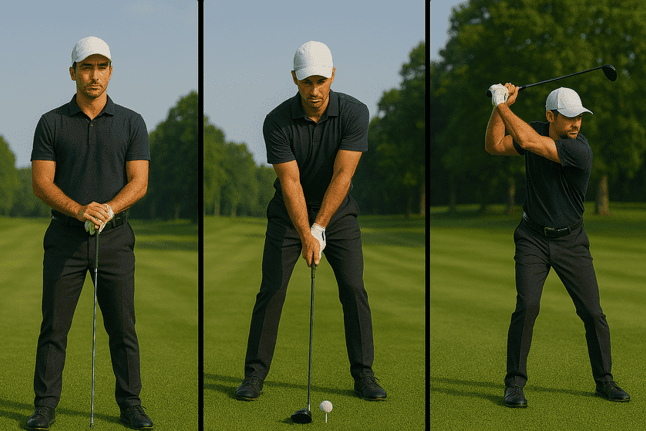

Visualization is a cornerstone technique in golf psychology. Tiger Woods and Phil Mickelson have used visualization to prime their minds for exceptional performance time and again. To incorporate this into your regimen:
Pre-Shot Visualization:
Take 10 seconds to mentally rehearse your shot. See your golf ball sailing toward the flag, creating a mental image that sets your body and mind up for success.Nightly Visualization Practice:
Before bed, visualize a perfect round of golf. This practice can lead to an improvement in golf concentration, allowing you to carry a deep sense of confidence and a positive mindset into the next day’s game.
Physical Fitness and Recovery: Fueling the Mind-Body Connection
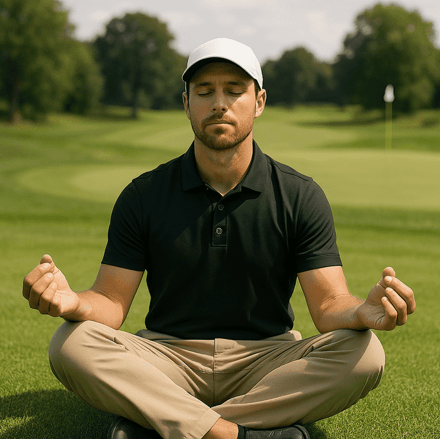

A robust mental game isn’t developed in isolation. Physical fitness plays a crucial role in ensuring your mind remains sharp and capable of enduring long rounds on the course. Research and professional golf coaches—from those quoted in Golf Monthly to insights featured in GOLF Magazine—agree that both nutrition and physical conditioning are fundamental elements for peak performance.
Staying Fit for Golf


Aerobic Exercises:
Brisk walking or jogging for at least 20 minutes helps maintain overall stamina, essential for keeping mental energy high during long championship rounds or challenging golf tournaments.Strength Training:
Incorporate body weight exercises like squats and push-ups, along with activities with strength training and flexibility workouts such as yoga. These exercises not only improve physical fitness but also contribute to the physical aspect of your control and balance during a swing.Regular Exercise and a Consistent Daily Routine:
A consistent daily routine that includes regular exercise builds physical and mental strength simultaneously, preparing you to handle challenging sports environments and adverse game-time conditions.
The Role of Nutrition and Sleep
Fuel Your Body and Mind:
Snacks like nuts, bananas, and energy bars, coupled with proper hydration (water or electrolyte drinks) ensure that your brain has the fuel it needs. Missing out on these essentials could lead to a lapse in concentration and increased susceptibility to a bad shot or bad breaks.Sleep:
Aim for 7–8 hours of sleep per night. Quality sleep is essential for a refreshed body, increased mental energy, and peak performance—both on the course and in everyday life.
Embracing a Growth Mindset: Turning Setbacks into Opportunities


Every golfer, no matter how accomplished, faces the reality of a poor shot or a bad practice session from time to time. However, it’s precisely in these moments that developing a growth mindset can be a game-changer. Embracing the idea that failure in golf involves an opportunity for growth not only refines your technique but also builds resilience.
Learning and Evolving After a Poor Shot


Self-Review and Feedback:
Analyze each bad shot or missed putt as a learning moment. Use a golf journal to reflect on what went wrong and how you can improve. Recording your thoughts and experiences helps solidify valuable lessons from every practice round.Growth Through Challenges:
Ask yourself, “What’s the lesson?” after every setback. By treating each challenge as an opportunity for growth, you gradually build a stronger, more confident mindset that carries over into all facets of life.Constructive Feedback:
Whether it’s advice from a golf coach, a trusted golf team, or insights from a trusted golf program, learn to embrace feedback for continuous improvement. This reflective practice often reveals subtle details about your swing mechanics and mental focus that might otherwise go unnoticed.
Lessons from Elite Golfers: How Champions Build Mental Strength
Study the greats to gain valuable insights. Elite or national-level golfers have honed their mental game through a combination of strategy, exercise, and continuous practice. Their stories provide not just inspiration but also practical advice that can be adapted into your routine.
Insights from Golf Legends
Gary Player:
Recognized for his incredible discipline and mental strength, Gary Player reminds us that a complete focus and an active mind on the course are paramount. His philosophy underscores that every challenging situation—be it a difficult golf hole or adverse conditions—is a chance to demonstrate resilience.Tiger Woods:
Known for his laser-like focus and visualizations, Woods’s method involves detailed pre-shot routines that include practice swings, deep breaths, and vivid mental imagery. His confidence in competition, even in the face of high-pressure situations, demonstrates that a strong mental game is as vital as physical skills.Phil Mickelson:
The five-time major winner is famous for his clutch performances under pressure. His pre-shot routine—a blend of practice swings, strategic cues, and mindfulness—is the blueprint for turning a bad shot into a stepping stone for success. As evidenced in various profiles in Golf Digest and Golf Monthly, his ability to maintain control under pressure is a testament to the value of a consistent mental routine.Bob Rotella:
As a renowned sports psychologist and author of Golf Is Not a Game of Perfect, Rotella’s teachings emphasize the importance of positive self-talk and mindfulness. His insights help golfers transform negative thoughts into a powerhouse of mental strength and focused energy.
Integrating Mental Strategies into Your Holistic Golf Regimen
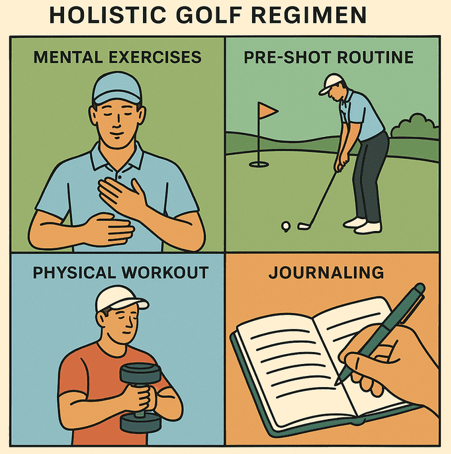

Success on the golf course is achieved when you combine physical fitness, a well-honed routine, and sharp mental strategies. A holistic approach to your golf game means paying attention to both the mind and the body, ensuring that no element—from the golf club in your hand to the focus in your mind—is left to chance.
Key Components of a Holistic Golf Regimen
Daily Mental Exercises:
Incorporate mindfulness practices, such as the 5-4-3-2-1 grounding technique, before each shot. These exercises help bring your complete focus to the present moment, cutting through distractions whether you’re on a pristine championship golf course or battling a difficult situation in everyday life.

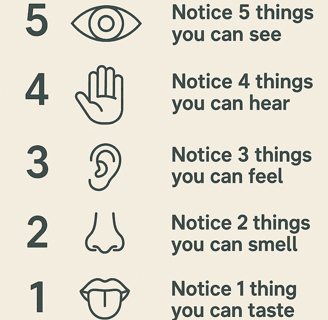
Regular Practice Sessions:
Use art practice facilities or your local golf course to master your pre-shot routine, practice swings, and controlled breathing exercises. Even a session following a bad practice session can be reframed as an opportunity for growth and improvement in your overall golf mental strategy.Strength and Conditioning Workouts:
Engage in aerobic exercises, regular strength training, and flexibility workouts to not only build physical fitness but also to enhance your mental resilience. A well-conditioned body contributes directly to a tough mental game, ensuring that every swing—from the perfect swing to a recovering shot after missing the mark—carries the promise of controlled performance.Structured Daily Routine:
Build a daily routine that integrates physical workouts, dedicated practice sessions, and mental preparation exercises. This structure is key to maintaining an active mind and body, both essential for facing unexpected conditions or turbulent game-time pressures.
From the Green to Everyday Life: Applying Golf Mindset Tips Beyond the Course
The mental strategies employed on the golf course aren’t isolated—they echo into everyday life. Golf teaches us about focus, resilience, and the power of a positive mindset. Whether you’re a tough golfer facing a high-pressure situation on a championship golf course or an amateur navigating day-to-day challenges, the lessons learned from golf psychology can help enhance every aspect of your life.
Practical Life Lessons from Golf


Complete Control and Conscious Control:
The principle of controlling what you can—like your attitude, effort, and routine—translates well beyond the sport. Just as you focus on your pre-shot routine, you can develop strategies to maintain concentration in challenging work or personal situations.The Role of Feedback and Growth:
Like receiving input from a seasoned golf coach or through reviewing swing videos, continual self-reflection and learning can transform setbacks in everyday activities into opportunities for personal growth.Embracing Challenges with Confidence:
The positive mindset you build on the golf course, through deep breaths and thoughtful strategies, sets the foundation for tackling obstacles beyond the sport—whether you’re dealing with adverse conditions in a sports event or challenging circumstances at work.
Conclusion: Tee Off on Your Mental Game Journey
Mental toughness is the linchpin for exceptional performance, whether you’re sinking a critical putt on a championship golf course, recovering from a poor shot, or simply finding incredible fun playing golf. Your mindset—the combination of a tailored pre-shot routine, positive self-talk, and structured mental exercises—is the ultimate strength that propels you beyond the frustrations of a bad shot or a bad practice session.
This comprehensive guide has laid out the essential elements to enhance your golf game: from mastering your body language and deep breathing exercises to learning from golf legends like Tiger Woods, Phil Mickelson, and Gary Player. By integrating these practices into your daily routine and staying dedicated to your physical fitness and mental growth, you’re poised to experience the secret weapon that elite golfers rely on—a resilient and focused mind that consistently turns setbacks into comebacks.
Remember, golf improvement isn’t solely about perfect swing mechanics or the latest golf instruction. It’s about honing your mental toughness and embracing a growth mindset that transforms every missed putt, every bad break, and even every failure in golf into an opportunity to evolve as both a player and a person.
Now, take these strategies, commit to your pre-shot routine, and let your body and mind work in harmony. Whether you’re surrounded by images of Getty Images-worthy championship golf events or simply enjoying a casual round with your golf team, every swing becomes a chance to elevate your performance and live out the beautiful art of golf—a game of life, growth, and endless opportunity.
By embracing these mental strategies and integrating them into every facet of your game, you’re not just playing golf—you’re mastering a challenging sport and enriching an aspect of life that extends far beyond the green. Step onto the course with the confidence of a winner, knowing that your complete focus, strategic routine, and resilient mindset are your most powerful assets in pursuit of the perfect swing and an exceptional golf experience.
Now, go ahead and tee off on your journey of mental and physical excellence. Your active mind, resilient body, and renewed outlook on the game are waiting to bring you peak performance in every round of golf and every challenging facet of life.
FAQ: Mastering Mental Toughness in Golf
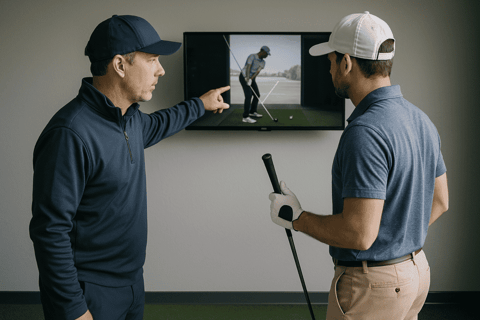

Q1: What is mental toughness in golf?
A: Mental toughness in golf is the ability to maintain complete focus, confidence, and a positive mindset regardless of challenges on the course. It involves managing self-talk, controlling emotions after a bad shot, and sticking to your pre-shot routine—even under adverse conditions like unpredictable weather or high-pressure situations.
Q2: Why is a pre-shot routine important?
A: A pre-shot routine helps anchor your focus before every swing. It integrates visualization, practice swings, controlled breathing, and body language cues, ensuring that you consistently set yourself up for success. Elite golfers like Tiger Woods and Phil Mickelson utilize routines to establish control over their game, making it a crucial strategy for both amateur and professional players.
Q3: How can I develop positive self-talk on the golf course?
A: Positive self-talk involves replacing negative thoughts (like “I’m awful” after a poor shot) with constructive affirmations such as “That’s just one swing—let’s nail the next.” Keeping a golf journal with daily affirmations and reflecting on challenges as opportunities for growth can help rewire your mind and build confidence in competition.
Q4: What visualization techniques can enhance my performance?
A: Visualization is a powerful tool in golf. Prior to swinging, take a few moments to create a clear mental image of your perfect shot—seeing your ball soar towards the target. Additionally, practicing nightly visualization to imagine an entire successful round can reinforce positive outcomes and boost mental focus during actual play.
Q5: What role does physical fitness play in improving my golf game?
A: A strong connection exists between physical fitness and mental toughness. Regular aerobic exercise, strength training, and flexibility workouts not only enhance your stamina and overall fitness but also improve concentration and resilience on the course. This holistic approach ensures both your body and mind perform at their peak during long rounds or high-pressure tournaments.
Q6: How can I overcome distractions on the golf course?
A: Distractions are common on the course, ranging from noise and weather fluctuations to on-course chatter. Techniques such as using a focus cue (a specific word like “Lock” or “Go”), practicing the 5-4-3-2-1 grounding method, or simply retreating into your pre-shot routine can help you shut out unwanted noise and maintain complete concentration.
Q7: How do I handle a bad shot or poor practice session?
A: When dealing with a bad shot, it’s important not to dwell on the mistake. Instead, use it as a learning experience by analyzing what went wrong and how you can adjust your strategy. Maintain a growth mindset by asking yourself “What’s the lesson here?” and use structured feedback from swing videos or a trusted coach to continuously improve.
Q8: What are some effective breathing exercises to use before a critical putt?
A: Controlled breathing exercises, such as the “4-4-4 Method” (inhale for 4 seconds, hold for 4 seconds, exhale for 4 seconds), can significantly reduce stress and lower your heart rate. Repeat the cycle a couple of times to calm your nerves and establish a sense of control before taking the shot.
Q9: Can improving my golf mental toughness benefit my everyday life?
A: Absolutely. The skills you develop on the golf course—like staying focused, managing stress, and maintaining a positive outlook—translate effectively into everyday challenges. Whether it’s handling work pressure or navigating personal setbacks, the mental strategies from golf can help you remain resilient, grounded, and solution-oriented.
Q10: Are there professional golfers who emphasize mental training?
A: Yes, numerous professional golfers, such as Tiger Woods, Phil Mickelson, and Gary Player, stress the importance of mental toughness and mental strategies in their training. Their reliance on routines, visualization, and controlled self-talk highlights how vital these elements are to achieving consistently high performance, making them an invaluable part of their overall game.
